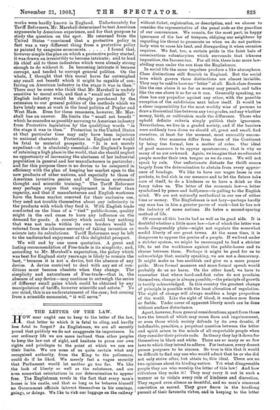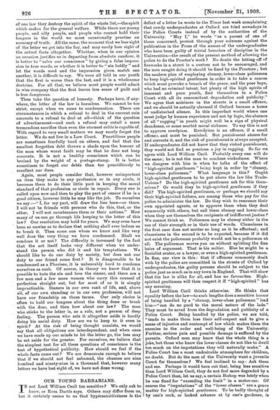THE LETTER OF THE LAW.
T_TOW near ought one to keep to the letter of the law, . that letter to which it is fatal to cling, and hardly less fatal to forget ? As Englishmen, we are all secretly proud that publicly we do not exaggerate its importance. In our ordinary life we are more inclined than other peoples to keep the law out of sight, and hesitate to press our own rights and privileges to the point at which we can see their limits. We are none of us quite certain what any recognised authority, from the King to the policeman, could do if he liked. We merely feel a vague security that Parliament would let neither go too far. We like the look of liberty as well as the substance, and are even somewhat ostentatious in our determination to appear free. The Englishman revels in the feet that every man's ,
house. is his castle, and that so long as he behaves himself no Government officials interest themselves in his comings, zoingo, or doings. We like to risk our luggage on the railway
without ticket, registration, or description, and we choose to consider the representative of the penal code as the guardian
of our convenience. We remain, for the most part, in happy Ignorance of the law of trespass, obliging our neighbour by regarding his threat to prosecute us when we do not particu- larly wish to cross his land, and disregarding it when occasion requires. We feel, too, a certain pride in the faint halo of conscientious voluntaryism which surrounds that irksome imposition, the Income-tax. For all this, there is no more law- abiding man under the sun than the Englishman.
In social life the same impulses produce a like atmosphere. Class distinctions still flourish in England. But the social laws which govern those distinctions are almost invisible. They may be said to have no " letter " at all. Each class dresses like the one above it so far as money may permit, and talks like the one above it so far as it can. Generally speaking, no class has any prejudice against any other, with the possible exception of the subdivision next below itself. It would be a sheer impossibility for the most worldly wise of persons to draw a theoretical line between any two grades, and say whether money, birth, or cultivation made the difference. Those who uphold definite criteria simply publish their ignorance. Nevertheless, we live in a graded society, and if the barriers were suddenly torn down we should all, great and small, find ourselves, at least for the moment, most execrably uncom- fortable. Our manners differ from those of the Continent by being less formal, less a matter of rules. Our ideal of good manners is to appear spontaneous; that is why so many of us are awkward. Again, we imagine that no educated people murder their own tongue as we do curs. We will not speak by rule. Our unfortunate distaste for thrift comes largely from the determination to abstain from every appear- ance of bondage. We like to have our wages loose in Our pockets, to feel rich in our measure and to let the future take care of itself, to do a kindness or to have a drink as the fancy takes us. The letter of the economic law—a letter symbolised by pence and halfpence—is galling to the English mind. We are not naturally methodical in our use of either time or money. The Englishman is not lazy—perhaps hardly any man has in him a greater power of work—but he has not the industry of some nations. He hates a second-sparing method of life.
Of course all this has its bad as well as its good side. It is doubtful whether a little more law—law of which the letter was made disagreeably plain—might not regulate the somewhat sordid liberty of our great towns. At the same time, it is dangerous to oppose the genius of a people. If we lived under a stricter system, we might be encouraged to lead a stricter life, to set the workhouse against the public-house and to choose between them. Perhaps it might be good for us to acknowledge that, socially speaking, we are not a democracy. It might make us less snobbish and give us a more proper pride. More formal manners and more formal speech would probably do us no harm. On the other hand, we have' to remember that where hard-and-fast rules do not proclaim themselves, change is always possible,—the principle of growth is tacitly acknowledged. In this country the greatest change of principle is possible with the least alteration of regulation. The sight of change will always madden a large proportion of the world. Like the sight of blood, it renders men fierce or feeble. Under cover of apparent liberty much can be dime without surface disturbance.
Apart, however, from general considerations, apart from those laws the breach of which may mean fines and imprisonment, or even those which society defends by its own drastic; if indefinable, penalties, a perpetual question between the letter and spirit arises in the minds of all respectable people when they consider their private code. In theory they lay it down,for themselves in black and white. There are so many or so few laws to which they intend to adhere. For instance, every decent person purposes to be sincere. So true is this that it would be difficult to find any one who would admit that be or she did not only strive after, but attain to, this ideal. There are no two opinions about its binding nature. Yet what disagreeable people they are who worship the letter of this law! And how ridiculous they make it! They may carry it out in such a manner as to violate every rule of kindness and discretion.
They regard even silence as deceitful, and no man's sincerest conviction as sacred. They grow fierce in the headlong pursuit of their favourite virtue, and in keeping to the letter of one law they destroy the spirit of the whole list,—the spirit which makes for the general welfare. While there are young people, and .silly people, and people who cannot hold their tongue:It in the world we must occasionally practise an economy of truth. All the same, the moment that we lose sight of the letter we get into the fog, and may easily lose sight of the actual facts altogether. Whether, when in our opinion an occasion justifies Us in departing from absolute candour, it is better to "salve our conscience" by giving a false impres- sion in true words, or whether it is better to "sin boldly" and let the words used and the impression given match one another, it is difficult to say. We were all told in our youth that the first is worse than the last, and it is a wholesome doctrine. For all that, we believe most people would admit in wise company that the first leaves less sense of guilt and is less dangerous.
Then take the question of honesty. Perhaps here, if any- where, the letter of the law is harmless. We cannot be too strict, except when we come to condemnation. There are circumstances in which a refusal to deal in the current coin amounts to a refusal to deal at all—think of the question of advertisement—and such a refusal may entail a more tremendous sacrifice than even the sternest critic is capable of. With regard to very small matters we may surely forget the letter. We do not live in a Law Court. Punctilious people are sometimes fearfully hard on others, and feel that the smallest forgotten debt throws a shade upon the honour of the man whose worst fault may be that he does not keep accounts. It is not a healthy conscience which can be bruised by the weight of a postage-stamp. It is better. sometimes to forget our debts than too punctiliously to recollect our dues.
Again, most people consider that, however unimportant an item they make in any profession or . in any circle, it becomes them to do their little part in keeping the moral standard of that profession or circle in repair. Every one is called upon now and then to play the part of censor if be is a good citizen, however little he may like the job. To ourselves we say :—" I, for my part, will draw the line here—or there. I will not be friends with persons who do this, that, or the other. I will not countenance them or their actions." How many of us can go through life keeping to the letter of this law? Our resolution may hold for years. We may even have been so unwise as to declare that nothing shall ever induce us to break it. Then some one whom we know and like very well does the very thing we have condemned. Shall we condone it or not ? The difficulty is increased by the fact that the act itself looks very different when we under- stand the person who did it and his temptations. We should like to do our *duty by society, but does not our duty to our friend come first ? It is disagreeable to be condemned as a Pharisee, it is unbearably bard to condemn ourselves as such. Of course,. in theory we know that it is possible to hate the sin and love the sinner, and there are a few men and a .few more women who carry this counsel of perfection straight out, but for most of us it is simply impracticable. Sinners in our own rank of life, and, above all, of our own. standing or in our own profession, will not have our friendship on those terms. Our only choice is often to hold our tongues about the thing .done or break with the 'doer, and then how about our la*? The man who sticks to the letter is, as a rule, not a person of deep feeling. The person who sets it altogether aside is hardly doing his social duty. How are we to keep to it even in spirit ? At the risk of being thought casuists, we would say that all obligations are interdependent, and when once we have made up our minds to let the letter go, the less may be set aside for the .greater. For ourselves, we believe that the simplest test for all these questions of conscience is the test of hypothetical publicity. How should we feel if the whole facts came out ? We are democrats enough to believe that if we should not feel ashamed, the chances are nine hundred and ninety-nine in a thousand that, however many letters we have lost sight of, we have not done wrong.

































































 Previous page
Previous page